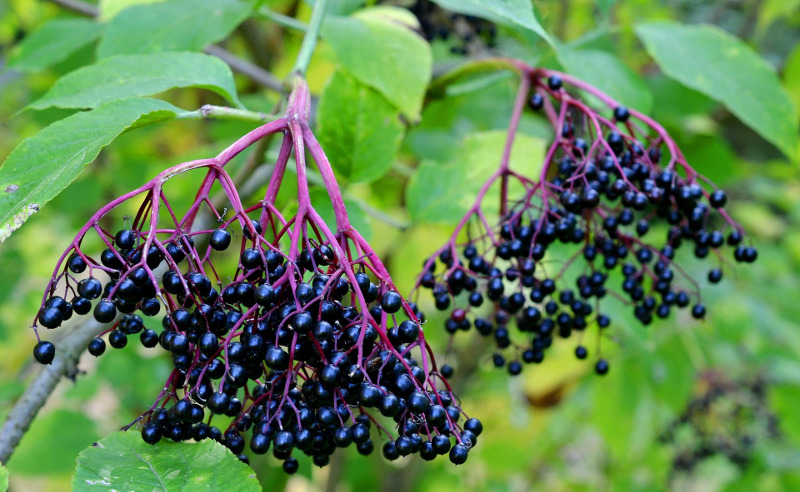Whether you’re looking to add elderberry plants to your landscape for native foliage for pollinators or for reaping the benefits of the berries, you’re probably wondering whether elderberry plants actually poisonous. The short answer is yes. The longer answer is that there are many beneficial properties to the plant when procured properly.

In all varieties of elderberry, the seeds, stems, leaves and roots are considered toxic. Ingestion of any parts of the elderberry plant may induce nausea, vomiting, loose stools and possibly coma due to the cyanide-inducing glycoside that resides within the plant. Hospitalization may be necessary for those affected.
However, you still may want to grow this beneficial plant within your landscape for its health benefits. This can be achieved by safely harvesting and cooking its berries to remove the glycosides. Fully ripe berries from the elderberry plant should always be cooked and the seeds removed.
Are Elderberry Poisonous to Children?
Elderberry is toxic to all humans that ingest the seeds, stems, leaves or roots of the plant. Toddlers and young children are more prone to put leaves or berries in their mouths, thus it is a concern when there is an elderberry bush present. Symptoms may range from nausea to other gastro-intestinal upsets to even coma. If ingested, it is urgent to have your child under the care of a medical provider. Take necessary precautions to keep curious hands away from elderberry bushes.

Are Elderberry Poisonous to Dogs?
Due to a toxic alkaloid and cyanogenic glycosides contained within the elderberry, it is toxic to dogs and should not be ingested. Dogs may be inclined to eat fallen berries or chew on fallen limbs. If your dog ingests any part of an elderberry bush, it may experience nausea, vomiting, diarrhea, organ failure or death. Immediate veterinary care is recommended.
Are Elderberry Poisonous to Cats?
As with humans and dogs, a toxic alkaloid and cyanogenic glycosides contained within the plant is considered toxic to cats. Although cats may not be particularly drawn to eating elderberry, accidental ingestion may happen. Symptoms from ingestion of the berries or foliage of elderberry may range from nausea, vomiting, diarrhea, organ failure or death. Immediate veterinary care is recommended.
Are Elderberry Poisonous to Other Animals?
Horses, cattle, goats and many other farm animals are susceptible to toxicity from ingestion of elderberry due to the toxic alkaloid and cyanogenic glycosides contained within the whole plant. Typically livestock and farm animals are not drawn to eat from the elderberry bush, however accidental ingestion may occur if food is sparse. Symptoms from ingestion of any part of the elderberry may be nausea, vomiting, diarrhea, organ failure or death. Immediate veterinary care is recommended if it is suspected that an animal has ingested elderberry.
Symptoms Of Elderberry Poisoning
Always check with your doctor or veterinarian for guidance if you suspect elderberry poisoning. With prompt care, severe illness and death may be prevented.
Here are some common symptoms to look out for:
- Nausea
- Vomiting
- Diarrhea
- Coma
Preventing Elderberry Poisoning
Keeping curious hands and mouths away from elderberry plants may very well save a life and prevent severe illness. Achieving a safe environment around elderberry plants should be of utmost importance. This can be done by building fences around the bush(es) or by applying sprayed deterrents that are bitter to prevent chewing. Elderberry can be highly beneficial for immune support, however precautionary care should always be in place when around these bushes.
Pet Poison Helpline
If something were to happen to your furry friend, and you suspect that they are suffering from elderberry poisoning, there is a poison control hotline to call for 24/7 vet advice. It is called the Pet Poison Hotline, and their phone number is (855) 764-7661.
Click here for a complete list of Pet Safe Plants.
Sources:
"Common Elderberry." Missouri Department of Conservation. mdc.mo.gov
"Elderberry." Colorado State University. poisonousplants.cvmbs.colostate.edu
"Sambucus nigra (subsp.) canadensis." University of Florida / IFAS. plants.ifas.ufl.edu
 |
Author Chris Link - Published 01-15-2022 |


